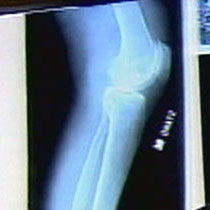2007年VOA标准英语-Global Positioning Systems Now Help Doctors Per(在线收听)
Washington
18 May 2007
The technology that helps drivers to navigate roads and soldiers to map their positions is now helping doctors repair worn-out knees. The medical procedure is called navigational knee surgery. VOA's Carol Pearson has more on how satellite technology is improving surgery.

The U.S. Defense Department developed the global positioning system, or GPS, for military purposes. It transmits precise radio signals by satellite technology. Non-military use includes helping drivers find their way around town. Police use GPS to track down people in emergency situations.
Now doctors are using the technology to guide them in precision surgery.
"You can see there is no more joint space, just bone on bone," points out Dr. Dominic Tse. He is preparing to use GPS to navigate through knee surgery. He begins by placing wireless trackers or transponders into the knee. The procedure is minimally invasive.
"The trackers send signals that are captured by the infrared optical system and then they're transmitted to a computer and then [the] computer analyzes it and creates a three-dimensional interactive knee model."
Next, Dr. Tse begins cutting away the damaged joint by carefully following this computerized diagram -- accurate to a fraction of a degree. "So it takes out all the guess work [and] provides far more accuracy than ever possible."
He replaces the damaged knee with an artificial knee. He says the navigational knee system also makes aligning the new knee easier.
Patient Bob Champion is pleased with the results. "I have 68 steps up to my house and I was able to go up and down the steps, was walking within a couple of days, without using any kind of support. I was back playing golf within six weeks after the surgery. So it was pretty amazing."
Grace Fong had two knee surgeries. Dr. Tse used navigational knee technology for her second operation. "On the first knee, I had to depend on medication for two weeks. But for the second one, I don't need any medication."
Because the surgery is precise and minimally invasive, patients have a quicker, easier recovery.